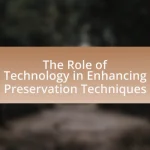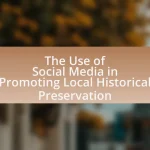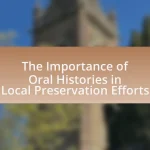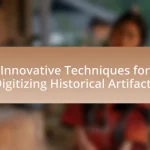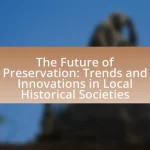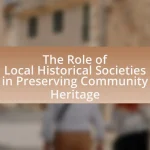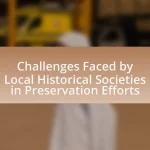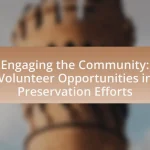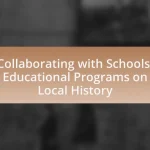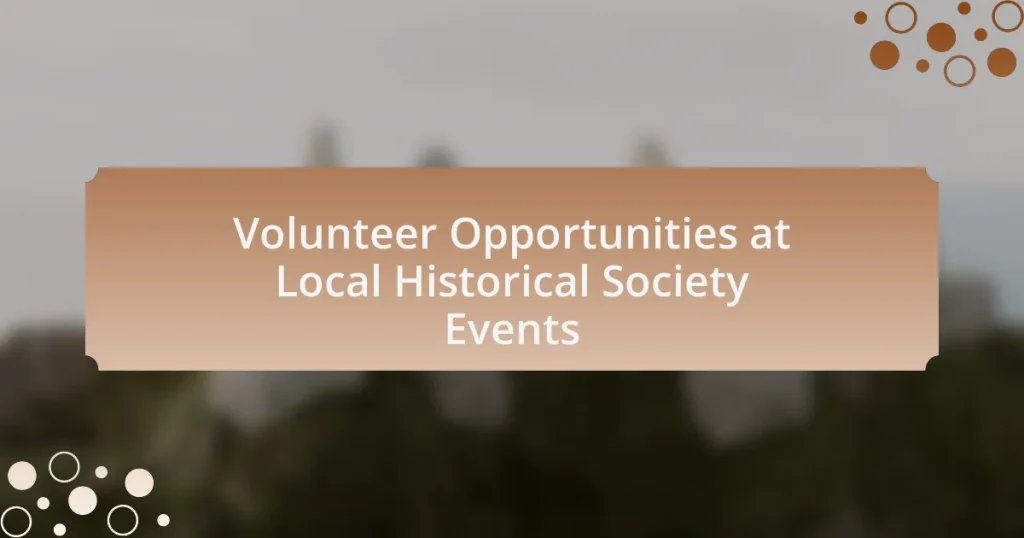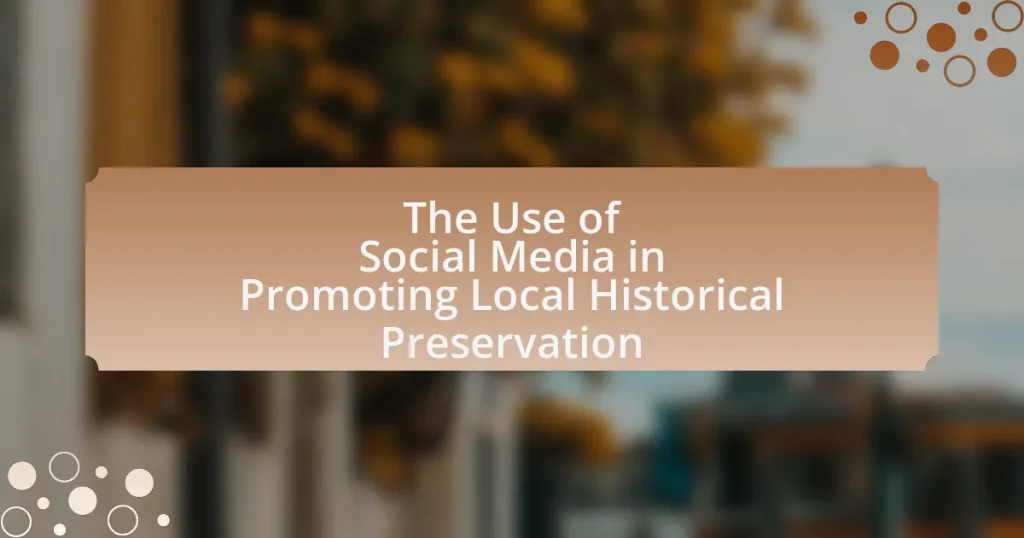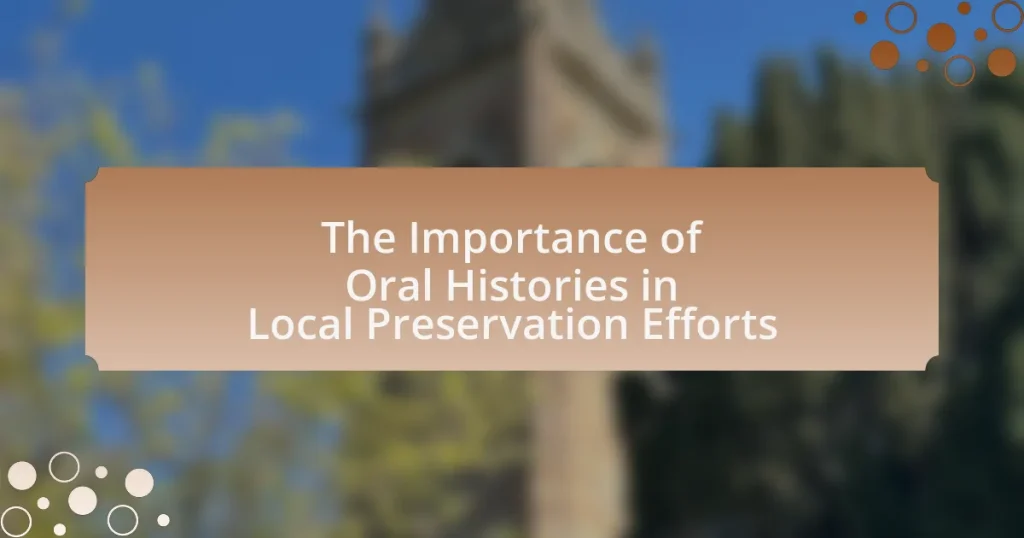Volunteer opportunities at local historical society events encompass various roles such as event planning, guiding tours, assisting with educational programs, and archival work. These positions enable individuals to engage with their community, promote local history, and support the preservation of historical artifacts. The article outlines how individuals can get involved, the skills required, and the significant impact volunteers have on community engagement and educational outreach. It also details the types of events organized by historical societies, the specific roles needed for each event, and the benefits of volunteering, including skill development and networking opportunities.
What are Volunteer Opportunities at Local Historical Society Events?
Volunteer opportunities at local historical society events typically include roles such as event planning, guiding tours, assisting with educational programs, and helping with archival work. These positions allow volunteers to engage with the community, promote local history, and support the preservation of historical artifacts. For instance, many historical societies rely on volunteers to organize annual events like heritage festivals or educational workshops, which can attract hundreds of attendees and foster community interest in local history.
How can individuals get involved in these volunteer opportunities?
Individuals can get involved in volunteer opportunities at local historical society events by contacting the society directly through their website or phone number. Many historical societies actively seek volunteers for various roles, such as event planning, guiding tours, or assisting with research. Interested individuals can often find specific volunteer applications or sign-up forms on the society’s website, which detail the types of opportunities available and any required qualifications. Additionally, attending society meetings or events can provide networking opportunities to learn more about how to contribute.
What types of roles are available for volunteers at these events?
Volunteers at local historical society events can take on various roles, including event setup, registration assistance, guided tours, educational outreach, and cleanup. These roles are essential for ensuring the smooth operation of events and enhancing visitor experiences. For instance, volunteers assisting with registration help manage attendee flow, while those leading guided tours provide valuable insights into historical exhibits, contributing to the educational mission of the society.
What skills or qualifications are needed to volunteer?
To volunteer, individuals typically need skills such as communication, teamwork, and organizational abilities. These skills facilitate effective interaction with other volunteers and the public, ensuring smooth event operations. Additionally, specific qualifications may include a background or interest in history, familiarity with local heritage, and the ability to commit time consistently. Research indicates that volunteers with these skills enhance the overall experience at events, contributing to successful outcomes and community engagement.
Why are volunteer opportunities important for local historical societies?
Volunteer opportunities are important for local historical societies because they provide essential support for preserving and promoting local history. These volunteers contribute their time and skills, enabling historical societies to organize events, maintain archives, and engage the community. For instance, a study by the National Council for History Education highlights that volunteer involvement can increase public participation in historical programs by up to 50%, demonstrating the significant impact volunteers have on community engagement and educational outreach.
How do volunteers contribute to the success of historical society events?
Volunteers significantly enhance the success of historical society events by providing essential support in various roles, including event planning, setup, and visitor engagement. Their involvement allows historical societies to host more comprehensive and engaging events, as volunteers often bring diverse skills and local knowledge that enrich the experience for attendees. For instance, a study by the National Council for History Education found that events with volunteer participation saw a 30% increase in visitor satisfaction, demonstrating the direct impact of volunteer contributions on event success.
What impact do volunteers have on community engagement and education?
Volunteers significantly enhance community engagement and education by fostering connections and facilitating learning opportunities. Their involvement in local historical society events promotes active participation, allowing community members to engage with their heritage and history. Research indicates that communities with active volunteer programs experience increased civic participation, as volunteers often serve as catalysts for community dialogue and collaboration. For instance, a study by the Corporation for National and Community Service found that volunteering can lead to a 20% increase in community engagement metrics, demonstrating the tangible impact of volunteers on local educational initiatives and community cohesion.
What types of events do local historical societies organize for volunteers?
Local historical societies organize a variety of events for volunteers, including educational workshops, community outreach programs, historical reenactments, preservation projects, and guided tours. These events provide volunteers with opportunities to engage with history, learn new skills, and contribute to the preservation of local heritage. For instance, educational workshops often focus on topics such as archival research or artifact conservation, while community outreach programs may involve organizing local history fairs or school presentations. Historical reenactments allow volunteers to immerse themselves in specific historical periods, enhancing public understanding of local history. Preservation projects typically involve hands-on work to maintain historical sites, and guided tours enable volunteers to share their knowledge with visitors, fostering a deeper appreciation for local history.
How do different events require different volunteer roles?
Different events require different volunteer roles based on the specific needs and activities associated with each event. For instance, a historical society’s exhibition may need volunteers for roles such as tour guides, who provide information about exhibits, while a fundraising gala may require volunteers for tasks like event setup, ticket sales, and catering assistance. Each role is tailored to the event’s objectives, ensuring that the necessary skills and responsibilities align with the event’s goals. This differentiation is crucial for effective event management and enhances the overall experience for attendees.
What are some examples of specific events that need volunteers?
Examples of specific events that need volunteers include local historical society open houses, community heritage festivals, and educational workshops. These events often require assistance with setup, guiding visitors, and providing information about historical exhibits. For instance, during a community heritage festival, volunteers may help manage booths, facilitate activities, and ensure a smooth experience for attendees, which is crucial for the event’s success.
How can volunteers prepare for various types of events?
Volunteers can prepare for various types of events by understanding the specific requirements and roles associated with each event. This preparation includes reviewing event details, such as the schedule, location, and tasks assigned, which ensures that volunteers are well-informed and ready to contribute effectively. Additionally, attending any pre-event training sessions or meetings is crucial, as these provide essential information about the event’s objectives and logistics. Engaging with event coordinators and fellow volunteers can also enhance readiness by clarifying expectations and fostering teamwork.
What are the benefits of volunteering at local historical society events?
Volunteering at local historical society events provides numerous benefits, including community engagement, skill development, and preservation of local history. Engaging with the community fosters connections and strengthens social ties, as volunteers often interact with diverse groups of people who share an interest in history. Additionally, volunteers can develop valuable skills such as event planning, public speaking, and teamwork, which enhance their personal and professional growth. Furthermore, by participating in these events, volunteers contribute to the preservation and promotion of local heritage, ensuring that historical narratives are maintained for future generations.
How does volunteering enhance personal skills and experiences?
Volunteering enhances personal skills and experiences by providing opportunities for individuals to develop communication, teamwork, and problem-solving abilities. Engaging in volunteer work, particularly at local historical society events, allows volunteers to interact with diverse groups, fostering interpersonal skills and cultural awareness. Research indicates that 70% of volunteers report improved social skills and increased confidence as a result of their experiences. Additionally, volunteering often involves planning and executing events, which enhances organizational and leadership skills. These practical experiences contribute to personal growth and can be beneficial in both personal and professional contexts.
What networking opportunities arise from volunteering?
Volunteering at local historical society events provides significant networking opportunities by connecting individuals with like-minded community members, professionals in the field, and local leaders. Engaging in these events allows volunteers to build relationships with historians, educators, and other volunteers who share a passion for history and community service. Additionally, these interactions can lead to mentorship opportunities, collaborations on future projects, and access to exclusive events or resources within the historical community. Research indicates that volunteering enhances social networks, as individuals often meet new contacts who can provide career guidance or job leads, thereby expanding their professional connections.
How can volunteers effectively contribute to local historical society events?
Volunteers can effectively contribute to local historical society events by assisting with event planning, promotion, and execution. Their involvement can include organizing logistics, setting up venues, managing registrations, and providing guided tours, which enhances the overall experience for attendees. For instance, a study by the National Council for History Education indicates that volunteer-led tours significantly increase visitor engagement and satisfaction at historical events. By leveraging their skills and enthusiasm, volunteers help create a vibrant atmosphere that fosters community interest in local history.
What best practices should volunteers follow during events?
Volunteers should prioritize clear communication during events to ensure smooth operations and effective teamwork. This involves actively listening to instructions, asking questions for clarification, and providing updates on tasks. Additionally, volunteers should arrive on time and be prepared with necessary materials, as punctuality and preparedness contribute to the overall success of the event. Maintaining a positive attitude is also crucial, as it fosters a welcoming environment for attendees and encourages collaboration among team members. Following safety protocols is essential to protect both volunteers and participants, ensuring a safe and enjoyable experience for everyone involved.
How can volunteers ensure they are making a positive impact?
Volunteers can ensure they are making a positive impact by aligning their efforts with the specific needs of the local historical society and actively engaging with the community. By understanding the goals and objectives of the historical society, volunteers can tailor their contributions to support preservation efforts, educational programs, and community outreach initiatives. Research indicates that targeted volunteer efforts can enhance community engagement and improve the effectiveness of local organizations (Cnaan, R. A., & Cascio, T. A., 2013, “The Role of Volunteers in Community Development,” Journal of Community Practice). This alignment not only maximizes the benefits of their work but also fosters a sense of ownership and connection within the community.
What should volunteers do to prepare for their roles?
Volunteers should familiarize themselves with the specific tasks and responsibilities associated with their roles. This preparation includes reviewing event details, understanding the historical context of the society’s mission, and participating in any training sessions offered. Engaging with fellow volunteers and coordinators can provide insights into best practices and expectations. Additionally, volunteers should gather necessary materials, such as identification or uniforms, and ensure they are aware of the event schedule and location. This thorough preparation enhances the effectiveness of volunteers and contributes to the overall success of the historical society events.
What resources are available for potential volunteers?
Potential volunteers can access various resources, including informational websites, training programs, and community outreach events. Websites of local historical societies often provide details on volunteer opportunities, application processes, and upcoming events. Training programs may be offered to equip volunteers with necessary skills and knowledge about historical preservation and event management. Additionally, community outreach events serve as platforms for potential volunteers to learn more about the organization, meet current volunteers, and understand the impact of their contributions. These resources collectively facilitate informed participation in local historical society events.
How can volunteers find information about upcoming events?
Volunteers can find information about upcoming events by checking the local historical society’s official website, which typically lists all scheduled activities. Additionally, volunteers can subscribe to newsletters or follow the society’s social media channels for real-time updates. Many historical societies also post event flyers in community centers and libraries, providing another avenue for volunteers to stay informed.
What support do historical societies provide to their volunteers?
Historical societies provide various forms of support to their volunteers, including training, resources, and recognition. Training programs equip volunteers with the necessary skills and knowledge about local history, preservation techniques, and event management. Resources such as access to archival materials, historical documents, and tools for research enhance the volunteers’ ability to contribute effectively. Additionally, recognition through awards, events, and public acknowledgment fosters a sense of community and appreciation, motivating volunteers to remain engaged and committed to the society’s mission.
What tips can enhance the volunteer experience at local historical society events?
To enhance the volunteer experience at local historical society events, effective communication and training are essential. Volunteers should receive clear instructions and background information about the event, which fosters confidence and engagement. Studies show that well-informed volunteers are more likely to feel satisfied and committed, as they understand their roles and the significance of their contributions. Additionally, creating a welcoming environment through team-building activities can strengthen relationships among volunteers, leading to a more enjoyable experience. Research indicates that social connections among volunteers can increase retention rates and overall satisfaction.
